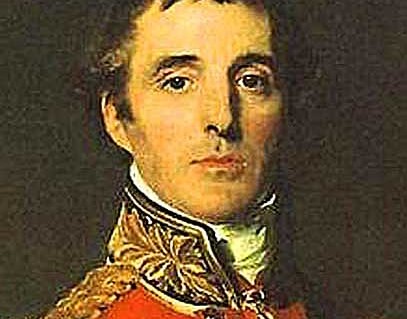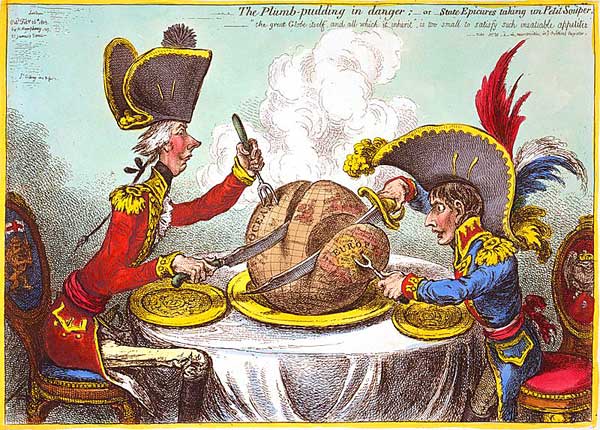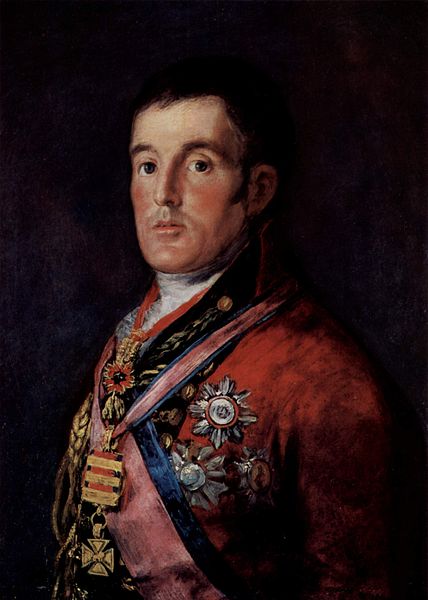Iron Man

Arthur Wellesley and Waterloo (18 June, 1815)
Of the 1st Duke of Wellington (1/5/1769 – 14/9/1852), Philip Guedulla asked “How many English streets, squares, monuments, and licensed premises bear the name of Wellington?” TVC would extend this fame phenomenon to the whole Commonwealth: its once favourite pub in Melbourne was the D of W on Flinders Street, the oldest mainland tavern in Australia, now renovated beyond memory. He was born in the same year as Napoleon, and after a stint at Eton, entered the lists of war and politics. He saw action in the Netherlands, India and in the Peninsular War, in which he rose to the rank of Field Marshal.
Napoleon made a dramatic return from exile and during the Hundred Days, made Europe tremble. The Bourbons trembled: Louis XVIII skipped town. It was left to the Iron Duke (getting dispatches rather late at the Duke of Richmond’s Ball) and his steely ally, the Prussian Marshal Blücher, to prop up a regime half as competent as Bonaparte, but more manageable. Yet it is probably true that this was the Corsican’s last glorious throw of the dice – the world (Byron and friends excepted) was galvanized against him, and had he won, he would have only staved off inevitable defeat.

Pitt & Boney carve up the Magic Pudding that was the World (Pitt gets the bigger slice but Bonaparte’s is arguably choice) Drawing by James Gillray
On Sunday, 18 June, 1815, Wellington met Napoleon on the battlefield at Waterloo, about 10 miles south of Brussels. ‘Old Hooky’ had less men and fewer guns but, being an Englishman, knew about rain, so he waited on the ridge for the French to come charging at him across the slush. This they did heroically, over and over, but were sliced to ragged by the discipline of Wellington’s multicultural forces. And when Blücher finally arrived, as promised, he smote the emperor’s unguarded flank in the half-darkness. As always, too late, each of the conqueror’s minions found that, in Stendhal’s words from The Charterhouse of Parma, “war was no longer that noble and universal impulse of souls devoted to glory that he had figured it to be from Napoleon’s proclamations!”
Chaos and waste lay everywhere – “Nothing except a battle lost can be half so melancholy as a battle won.”
After which, it was time to remove the famous boots and back to civil life and strife, sitting for ever more portraits.
Tennyson wrote (in somewhat florid fashion): “Mourn, for he seems to us the last, Remembering all his greatness in the Past. No more in soldier fashion will he greet With lifted hand the gazer in the street. O friends, our chief state-oracle is mute: Mourn for the man of long-enduring blood, The statesman-warrior, moderate, resolute, Whole in himself, a common good…..O iron nerve to true occasion true, O fall’n at length that tower of strength Which stood four-square to all the winds that blew!”
[Bootiana: “The Duke” by Philip Guedalla (1931) written in the old thud and blunder style; “Wellington: the Years of the Sword” by Elizabeth Longford (1969); “Wellington – A Personal History” by Christopher Hibbert (1997); “Wellington:the Path to Victory” by Rory Muir (2013); “Went the Day Well? Witnessing Waterloo” by David Crane (2015); [“Waterloo” by ABBA, a winner at Eurovision], and vide countless other books, with more flooding in over 2015, the battle’s bicentenary year.]
Leave a comment...
While your email address is required to post a comment, it will NOT be published.



2 Comments